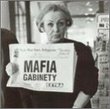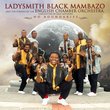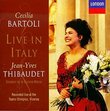| All Artists: Nikos Skalkottas, Nikos Christodoulou, BBC Symphony Orchestra Title: Nikos Skalkottas: 36 Greek Dances; The Return of Ulysses Members Wishing: 0 Total Copies: 0 Label: Bis Release Date: 2/28/2006 Album Type: Import Genres: Dance & Electronic, Classical Styles: Ballets & Dances, Dances, Symphonies Number of Discs: 2 SwapaCD Credits: 2 UPCs: 675754606022, 7318591333340 |
Search - Nikos Skalkottas, Nikos Christodoulou, BBC Symphony Orchestra :: Nikos Skalkottas: 36 Greek Dances; The Return of Ulysses
 | Nikos Skalkottas, Nikos Christodoulou, BBC Symphony Orchestra Nikos Skalkottas: 36 Greek Dances; The Return of Ulysses Genres: Dance & Electronic, Classical
|
Larger Image |
CD DetailsSimilar CDs
Similarly Requested CDs
|
CD ReviewsUnfair Wayne A. | Belfast, Northern Ireland | 10/06/2005 (5 out of 5 stars) "I enjoyed this set immensely and sat through two hours of it captivated by the music. The sense that I got was that Skalkottas was not trying to outdo Enescu's Rhapsodies or anything remotely like that. The music, as performed here, has a very modern tinge, the arrangements--at times--are, elegant, almost Stravinskian. I was expecting folk-drenched pap (and two hours of that would have bored me) and instead I was impressed by the composer's abilities to turn this wonderful music into something very contemporary. It made sense in an immediate way--Greece, at this point in history, did not have a strong "Classical Music" tradition. Skalkottas wasn't making pop music to entertain the tourists--a very pre-Great War concept anyway--but was trying to gain entry to the sophisticated culture of Europe overall. Also, Greece, to an educated person of this era meant Classical Greece as much as Contemporary Greece and the music seems to make nods in that direction. A nice blending overall. With respect, I'd suggest that those who want to listen to music like this and "stand on their chairs" should simply turn directly to traditional Greek folk interpretations. This is a terrific collection, magnificently played and beautifully recorded. I imagine it must have ended up on some "best of the year" lists. I'm sure the conductor--with roots to a culture that certainly knows how to make audiences stand on chairs--made a very conscious and thoughtful interpretive decision here. Personal insults aren't necessary. However, I do note that the conductor would seem to be Rumanian and the negative reviewer Greek so perhaps we're seeing a manifestation of some regional bias." Extraordinary music - terrible performance Porat Y C Jacobson | 10/20/2008 (2 out of 5 stars) "I love Skalkottas's music. In fact his Largo Sinfonica has to be one of the most intense, concentrated half hour single movements - superseding, in my opinion, even Mahler's slow movement of his 9th. Among the handful of CDs I have of his music, there are at least 10 or more of his dances (as fillers) all conducted by Christodoulou. They are very deep pieces, full of movement and pathos, and beautifully played. That is with Malmo Symphony orchestra. So, although the double cd was expensive I couldnt wait to get hold of the complete 36 dances.
I was terribly disappointed - but I am not sure I know enough to pinpoint exactly what the problem is. The audible difference between the Malmo and BBC recordings seems to be the instrumentation - the BBC is dominated by percussion and brass, whereas the Malmo is predominantly string based - sound that brings out pathos and national sentiment more than the bombast of the military-band-sounding BBC. The BBC recordings are bland, bombastic and facile recordings of very deep and beautiful music. Even the phrasing is different between the two recordings, despite Chris. being the conductor of both. Honestly, perhaps the BBC orchestra thought they were playing an Elgar pomp and circum-like march! I cannot tell you how disappointed I am - was looking forward to the full set - but cannot play these CDs - they are simply unbearable once I have those beautiful Malmo recordings to compare them to. Maybe some musicologist can explain how and why these two recordings differ - why one has brass and the other not - did Skalkottas write two versions - one for strings only and one for full orchestra? Or do they both have same instrumentation with BBC (or sound engineer) emphasizing brass more?" |

 Track Listings (24) - Disc #1
Track Listings (24) - Disc #1






